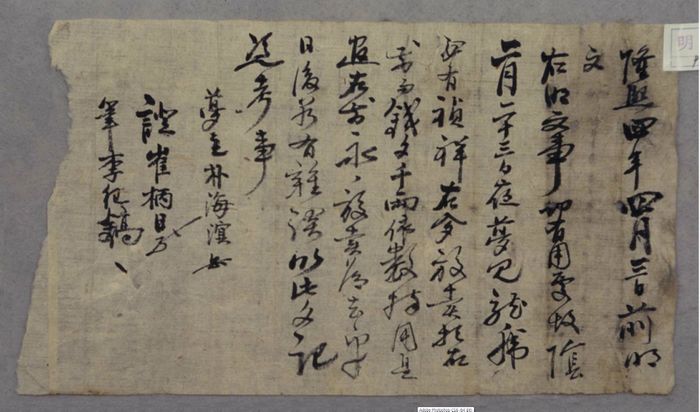(Translation) 1910年 朴海溟 賣夢明文
장서각위키
| Primary Source | ||
|---|---|---|
 |
Title | |
| English | A Document of Selling a Dream | |
| Chinese | 1910年 朴海溟 賣夢明文 | |
| Korean(RR) | 1910년 박해명 매몽명문(Pak Haemyŏng Maemongmyeongmun) | |
| Text Details | ||
| Genre | Social Life and Economic Strategies | |
| Type | Record | |
| Author(s) | 朴海溟 | |
| Year | 1910 | |
| Source | ||
| Key Concepts | Trading | |
| Translation Info | ||
| Translator(s) | Participants of 2017 Summer Hanmun Workshop (Advanced Translation Group) | |
| Editor(s) | ||
| Year | 2017 | |
목차
- 1 Introduction
- 2 Original Script
- 3 Translation
- 3.1 Student 1 : (Irina)
- 3.2 Student 2 : (Write your name)
- 3.3 Student 3 : (Write your name)
- 3.4 Student 4 : (Write your name)
- 3.5 Student 5 : (Write your name)
- 3.6 Student 6 : (Write your name)
- 3.7 Student 7 : King Kwong Wong
- 3.8 Student 8 : (Write your name)
- 3.9 Student 9 : (Write your name)
- 3.10 Student 10 : (Write your name)
- 3.11 Student 11 : (Write your name)
- 3.12 Student 12 : (Write your name)
- 3.13 Student 13 : (Write your name)
- 3.14 Student 14 : (Write your name)
- 4 Further Readings
Introduction
Original Script
| Classical Chinese | English |
|---|---|
|
隆熙四年四月三日前明文 右明文事 切有用處故 陰 二月二十三日夜夢見龍虎 必有禎祥 右夢放賣於右 前 而錢文千兩依數捧用是 遣 右前永永放賣爲去乎 日後若有雜談 以此文記 憑考事 夢主朴海溟 證崔柄日 筆李紀鎬 |
(translation) |
Translation
Student 1 : (Irina)
- Discussion Questions:
In Korea faith in auspicious dreams has a long tradition and this tradition is still alive. Which are the dreams regarded most auspicious in modern Korea?
Student 2 : (Write your name)
- Discussion Questions:
Student 3 : (Write your name)
- Discussion Questions:
Student 4 : (Write your name)
- Discussion Questions:
Student 5 : (Write your name)
- Discussion Questions:
Student 6 : (Write your name)
- Discussion Questions:
Student 7 : King Kwong Wong
- Discussion Questions:
- What does this document tell us about the legal practice of commercial activities in the late Choson period? How does it different or not different from previous period?
- Why would a person sell his/her dream? And why would one buy it? What does the practice of selling dream tell us about the religious and social aspect of Choson society?
Student 8 : (Write your name)
- Discussion Questions:
Student 9 : (Write your name)
- Discussion Questions:
Student 10 : (Write your name)
- Discussion Questions:
Student 11 : (Write your name)
- Discussion Questions:
Student 12 : (Write your name)
- Discussion Questions:
Student 13 : (Write your name)
- Discussion Questions:
Student 14 : (Write your name)
- Discussion Questions: 1) Did joseon people generally believe that they could buy and sell dreams? 2) Why do you think this document does not bear the name of the person who buys the dream? 3) Let's say someone bought this dream, what roles would this document have played?